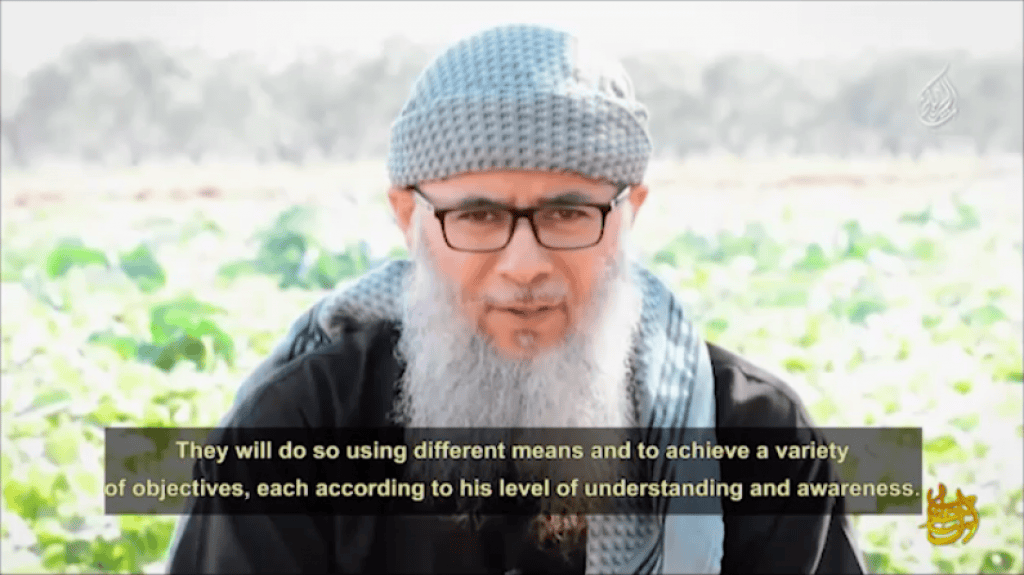
The U.S. State Department has announced rewards of up to $5 million each for information concerning three al Qaeda leaders in Syria. All three have been involved in the heated disagreements regarding jihadi strategy and leadership in the Levant.
The men lead Hurras al-Din (HAD, or the “Guardians of Religion” organization), which was formed in early 2018.
“All three leaders have been active in al-Qaeda (AQ) for years and remain loyal to AQ leader Ayman al-Zawahiri,” the State Department reports.
The first jihadist named in the rewards announcement is Abu ‘Abd al-Karim al-Masri, an Egyptian national who is “also known as Karim.” State describes Karim as a “member” of HAD’s shura (or consultative) council, adding that he “served as a mediator between the group and the Nusrah Front.” (Nusrah Front has been known as Hay’at Tahrir al-Sham, or HTS, since early 2017.)
FDD’s Long War Journal has reported extensively on Karim, including his key role in overseeing a reconciliation between HTS’s leadership and other HAD figures. According to a jihadi source online, Karim isn’t merely a senior member of HAD, but has also sat on al Qaeda’s elite shura council. This means he is part of the organization’s international management and advisory team.
It appears Karim is the same man who goes by the nom de guerre Abu ‘Abd al-Karim al-Gharbi. Gharbi has threatened the U.S. and Russia in messages posted on Telegram and al Qaeda-linked websites. He is a prolific commentator on the jihadists’ affairs.

The second jihadist named in today’s reward announcement is Faruq al-Suri, a Syrian national who is “also known as Samir Hijazi and Abu Hammam al-Shami.” State notes al-Suri “fought in Afghanistan in the 1990s and trained AQ fighters in Iraq, among other activities.”
Separately, the State Department added both HAD and Faruq al-Suri to the U.S. government’s designation lists earlier this week. The U.S. described al-Suri as the “leader” of HAD. While al-Suri was the group’s first emir, the United Nations Security Council has identified another al Qaeda veteran, Abu al-Qassam, as HAD’s current emir.
FDD’s Long War Journal has profiled and reported on Faruq al-Suri (a.k.a. Abu Hammam al-Shami) on several occasions as well. He was initially a top military commander for Al Nusrah Front, al-Qaeda’s official branch in Syria until July 2016. He rejected Al Nusrah’s rebranding as Jabhat Fath al-Sham (JFS) and evolution into Hay’at Tahrir al-Sham.
Sami al-Uraydi, “also known as Abu Mahmud al-Shami,” is the third al Qaeda leader included in the reward offer. Al-Uraydi is “a Jordanian national and senior sharia official for Hurras al-Din.”
The State Department says al-Uraydi “previously was involved in terrorist plots against the United States and Israel.”
Al Qaeda’s global emir, Ayman al-Zawahiri, clearly thinks highly of al-Uraydi, as he has cited the Jordanian ideologue on more than one location. Footage of al-Uraydi was even included in al Qaeda’s 9/11 anniversary message this week.
In the footage used by As Sahab, al-Uraydi claims that Muslim scholars generally agree that waging jihad is a religious imperative. Al-Uraydi’s arguments were used to buttress Zawahiri’s critique of Islamic scholars who refuse to endorse al Qaeda’s global war.

“This is among the most binding of obligations as has been declared and agreed upon by the Muslim scholars,” al-Uraydi says in the footage included in the 9/11 anniversary production. “They have ruled that repelling the aggressing enemy that corrupts the religion and the worldly life of Muslims is the greatest of obligations.”
“We surely know that a large number of the sons of the ummah shall join the caravan of change, revival and jihad,” al-Uraydi says. “They will do so using different means and to achieve a variety of objectives, each according to his level of understanding and awareness.” He accuses the jihadists’ enemies of waging a “war against the ummah” with an “attack on the religion and the rule of the sharia.” Al-Uraydi charges the West and others with deliberately “spreading immorality” among Muslims.
Karim mediates between HTS and HAD
Jihadists in Syria have clearly respected Karim’s authority. Even when Faruq al-Suri and Sami al-Uraydi were bickering with HTS’s men, HTS relied on Karim to settle the dispute.
In late 2017, HTS named Karim as the head of a committee that was established to reconcile HTS with its critics. That effort came in response to an initiative promoted by al Qaeda’s global network, which sought to end the infighting in Syria.
HTS’s Julani and Faruq al-Suri (a.k.a. Abu Hammam) met under Karim’s supervision and brokered a deal in early 2018, though it appears that al-Suri’s comrades-in-jihad rejected it. There is some ambiguity regarding what exactly transpired.
By late 2018, Karim had established the “Holding Fast Committee,” which was still working to mediate any problems between HTS and HAD. Karim’s three-person committee did in fact resolve one thorny issue involving the custody of a young girl whose father had died in Syria.
As of early 2019, HTS and HAD reached a new accord, specifying that the two would cooperate on the battlefield and adjudicate any ongoing disputes in common sharia courts. While there remain disagreements between the two sides, HAD has been operating in Idlib and the surrounding areas, including territory dominated by HTS.
During his heated disagreements with HTS’s leadership, Faruq al-Suri implored HTS to behave like the Taliban in its relations with al Qaeda. His remark was telling, as both he and HAD continue to view the Taliban as a model for jihadist governance in Idlib and elsewhere. Faruq al-Suri’s alias is derived from his time serving as an instructor at al Qaeda’s Al Faruq training camp in pre-9/11 Afghanistan.
HAD has openly praised the Taliban, as well as Shabaab, which is al Qaeda’s branch in East Africa. In March, HAD’s general command published a statement lauding the two groups for their “patience” in planning attacks, adding that both are on the “path to defeating the Crusader-Zionist coalition,” which will “retreat” from the “lands of our ummah” in “defeat.”
HAD and other al Qaeda-linked jihadist organizations in Syria seek to continue their guerrilla war against Bashar al-Assad’s regime and its allies. The jihadists view the Taliban and Shabaab, both of which are seeking to build Islamic emirates, as good models to emulate because they have had some success against foreign forces and local governments.
HAD and its closest allies established an operations room known as “Incite the Believers,” which continues to target Assad’s loyalists and their battlefield partners as part of the insurgency.







